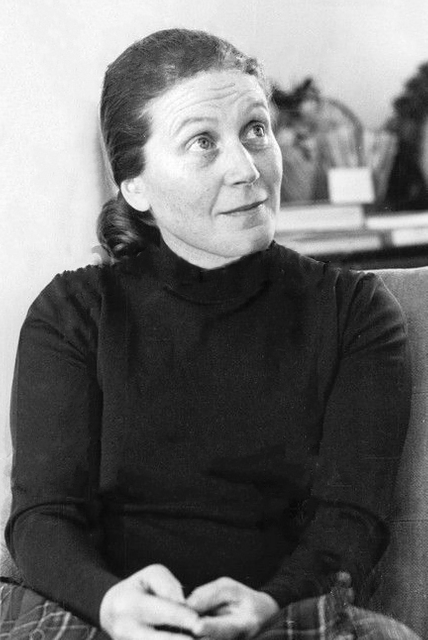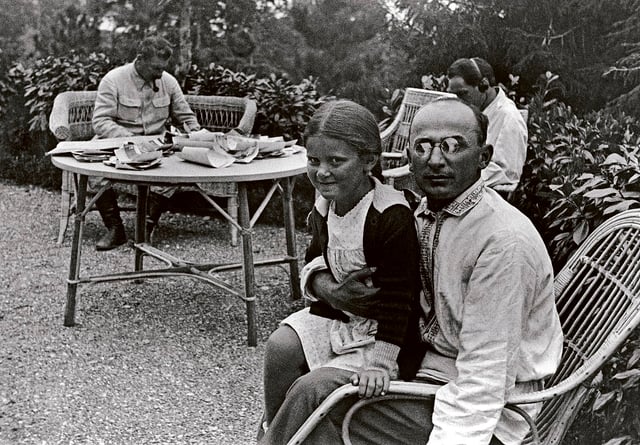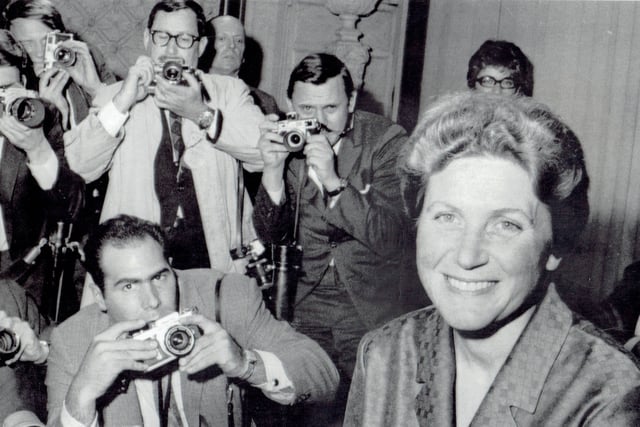Svetlana Alliluyeva

Svetlana Alliluyeva

Svetlana Alliluyeva | |
|---|---|
| Born | Svetlana Iosifovna Stalina (1926-02-28)28 February 1926 Moscow, Russian SFSR, Soviet Union |
| Died | 22 November 2011(2011-11-22)(aged 85) Richland Center, Wisconsin, U.S. |
| Nationality | Soviet (1926–1967, 1984–1991) American (naturalized 1978–1984) British (1992–2011) |
| Other names | Lana Peters |
| Occupation | Writer and Lecturer |
| Spouse(s) | Grigory Morozov (1944–1947) Yuri Zhdanov (1949–1952) Ivan Svanidze (1962–1963) William Wesley Peters (1970–1973) |
| Children | Iosif (1945–2008) Yekaterina/Katya (1950– ) Olga/Chrese Evans (1971– ) |
| Parent(s) | Joseph Stalin Nadezhda Alliluyeva |
| Relatives | Vasily Dzhugashvili (brother) Yakov Dzhugashvili (half-brother) Konstantin Kuzakov (half-brother) |
| Signature | |
Svetlana Iosifovna Alliluyeva (Russian: Светла́на Ио́сифовна Аллилу́ева; Russian: Сталина; 28 February 1926 – 22 November 2011), later known as Lana Peters, was the youngest child and only daughter of Soviet Premier Joseph Stalin and Nadezhda Alliluyeva, Stalin's second wife. In 1967, she caused an international furor when she defected to, and later became a naturalized citizen of, the United States. In 1984, she returned to the Soviet Union and had her Soviet citizenship returned. She later went back to the United States and also spent time in France, before settling in the United Kingdom in 1992. She was Stalin’s last surviving child.[1]
Svetlana Alliluyeva | |
|---|---|
| Born | Svetlana Iosifovna Stalina (1926-02-28)28 February 1926 Moscow, Russian SFSR, Soviet Union |
| Died | 22 November 2011(2011-11-22)(aged 85) Richland Center, Wisconsin, U.S. |
| Nationality | Soviet (1926–1967, 1984–1991) American (naturalized 1978–1984) British (1992–2011) |
| Other names | Lana Peters |
| Occupation | Writer and Lecturer |
| Spouse(s) | Grigory Morozov (1944–1947) Yuri Zhdanov (1949–1952) Ivan Svanidze (1962–1963) William Wesley Peters (1970–1973) |
| Children | Iosif (1945–2008) Yekaterina/Katya (1950– ) Olga/Chrese Evans (1971– ) |
| Parent(s) | Joseph Stalin Nadezhda Alliluyeva |
| Relatives | Vasily Dzhugashvili (brother) Yakov Dzhugashvili (half-brother) Konstantin Kuzakov (half-brother) |
| Signature | |
Early life

A young Svetlana Alliluyeva sitting on Lavrentiy Beria's lap, with Stalin (in the background, smoking his pipe) and Nestor Lakoba.[2]
Svetlana Alliluyeva was born on 28 February 1926.[3] On 9 November 1932, when she was 6, her mother, Nadezhda aged 31, shot herself in the head following a public spat with Stalin at a dinner party over the effects of the government's collectivization policies on the peasantry.[4] The official announcement was that Nadezhda died from appendicitis.[4][5] On 15 August 1942, Winston Churchill saw Alliluyeva in Stalin's private apartments at the Kremlin, describing her as "a handsome red-haired girl, who kissed her father dutifully". Churchill says Stalin "looked at me with a twinkle in his eye as if, so I thought, to convey 'You see, even we Bolsheviks have a family life.'"[6]
At the age of sixteen, Alliluyeva fell in love with Aleksei Kapler, a Jewish Soviet filmmaker who was 38 years old. Her father vehemently disapproved of the relationship and Kapler was sentenced to five years of exile in 1943 to Vorkuta and was then sentenced again in 1948 to five years in labor camps near Inta.[7]
Marriages
When she was seventeen years old, Grigory Morozov (1921–2001), a fellow student at Moscow University, proposed to her. Her father grudgingly allowed the couple to marry, although he made a point of never meeting the groom. A son, Iosif, was born in 1945. The couple divorced in 1947, but remained close friends for decades afterwards.[3]
Alliluyeva's second marriage was arranged for her to Yuri Zhdanov, the son of Stalin's right-hand man Andrei Zhdanov and himself one of Stalin's close associates. The couple got married in 1949. In 1950, Alliluyeva gave birth to a daughter, Yekaterina. The marriage was dissolved soon afterwards.[3] In 1962, she married Ivan Svanidze, the nephew of Stalin through his first wife, Ekaterine "Kato" Svanidze. Her third marriage also proved to be short-lived, and ended in 1963.[8] From 1970–73, she was married to American architect William Wesley Peters (an acolyte of Frank Lloyd Wright), with whom she had a daughter, Olga.[9]
After the death of Stalin
After her father's death in 1953, Alliluyeva worked as a lecturer and translator in Moscow. Her training was in History and Political thought, a subject she was forced to study by her father, although her true passion was literature and writing.[3] In a 2010 interview, she stated that his refusal to let her study arts and his treatment of Kapler were the two times that Stalin "broke my life", and that he loved her but was "a very simple man. Very rude. Very cruel."[10]
Relationship with Brajesh Singh
In 1963, while in hospital for a tonsillectomy, Alliluyeva met Kunwar Brajesh Singh, an Indian Communist from the Kalakankar Rajput Zamindar family visiting Moscow. The two fell in love. Singh was mild-mannered and well-educated but gravely ill with bronchiectasis and emphysema. The romance grew deeper and stronger still while the couple were recuperating in Sochi near the Black Sea. Singh returned to Moscow in 1965 to work as a translator, but he and Alliluyeva were not allowed to marry. He died the following year, in 1966. She was allowed to travel to India to take his ashes to his family to pour into the Ganges river. She stayed in the family home in Kalakankar on the banks of the Ganges for three months and became immersed in local customs, leading to her abandonment of atheism. In an interview on 26 April 1967, she referred to Singh as her husband but also stated that they were never allowed to marry officially.[11]
Political asylum and later life

Alliluyeva in 1967
On 6 March 1967, Alliluyeva approached the United States Embassy in New Delhi. After she stated her desire to defect in writing, the United States Ambassador Chester Bowles offered her political asylum and a new life in the United States.
At about nine o’clock p.m. in India, eleven in the morning Washington time, I said, "I have a person here who states she's Stalin's daughter, and we believe she's genuine; unless you instruct me to the contrary, I’m putting her on the one a.m. plane for Rome where we can stop and think the thing through. I’m not giving her any commitment that she can come to the States. I’m only enabling her to leave India, and we will see her to some part of the world—the U.S. or somewhere else—where she can settle in peace. If you disagree with this, let me know before midnight." No comment ever came from Washington. This is one advantage that non-career Ambassadors have; they can go ahead and do unorthodox things without anybody objecting, where a Foreign Service officer might not dare do it. We talked to her and said, "Point number one—are you really sure that you want to leave home? You’ve got a daughter and a son there, and this is a big step to take. Have you really thought it through? You could go back to the Russian embassy right now (she was staying there in their dormitory) and simply go to sleep and forget it, and get up Wednesday morning and on to Moscow, as your schedule calls for." She immediately said, "If this is your decision, I shall go to the press tonight; and announce that (a) democratic India will not take me (they had turned her down prior to her coming) and (b), now democratic America refuses to take me." Well, she didn't need to do it; I was just trying it on for size to be sure she had thought it through. But she was very quick on this.— Chester Bowles[12]
Alliluyeva accepted. The Indian government feared condemnation by the Soviet Union, so she was immediately sent from India to Rome. When the Qantas flight arrived in Rome,[12] Alliluyeva immediately travelled further to Geneva, Switzerland, where the government arranged her a tourist visa and accommodation for six weeks. She travelled to the United States, leaving her adult children in the USSR. Upon her arrival in New York City in April 1967, she gave a press conference denouncing her father's legacy and the Soviet government.[3]
During her years in exile, it is claimed that Alliluyeva was never happy. In a 2010 interview, she described herself as "quite happy here [Wisconsin]".[10] Her children who were left behind in the Soviet Union did not maintain contact with her. While Western sources saw a KGB hand behind this,[15] her children claimed that this is because of her complex character.[16] In 1983, after the Soviet government had stopped blocking Alliluyeva's attempts to communicate with her USSR-based children, her son Iosif began to call her regularly and planned to visit her in England, but was refused permission to travel by the Soviet authorities.[3]
She flirted with various religions.[7] While some claim she had money problems, others argue that her financial situation was good, because of her great popularity. For example, her first book, Twenty Letters to a Friend, caused a worldwide sensation and brought her, some estimate, about $2,500,000.[17][18] Alliluyeva herself stated that she gave away much of her book proceeds to charity and by around 1986 had become impoverished, facing debt and failed investments.[3]
In 1970, Alliluyeva answered an invitation from Frank Lloyd Wright's widow, Olgivanna Lloyd Wright, to visit Wright's winter studio, Taliesin West, in Scottsdale, Arizona.[19] In 1978, Alliluyeva became a US citizen,[3] and in 1982, she moved with her daughter to Cambridge in England, where they shared an apartment near the Cambridge University Botanic Garden.[19]
In 1984, during a time where Stalin's legacy saw partial rehabilitation in the Soviet Union, she moved back together with her daughter Olga, and both were given Soviet citizenship.[3] In 1986, she again moved to the US with Olga, and after her return denied anti-Western comments she had made while back in the USSR (including that she had not enjoyed "one single day” of freedom in the West and had been a pet of the CIA).[3]
Alliluyeva, for the most part, lived the last two years of her life in southern Wisconsin, either in Richland Center or in Spring Green, the location of Wright's summer studio "Taliesin". She died on 22 November 2011 from complications arising from colon cancer in Richland Center,[3][20] where she had spent time while visiting from Cambridge.[10]
At the time of Alliluyeva's death, her youngest daughter, Olga, went by the name Chrese Evans and ran a fashion boutique in Portland, Oregon. Yekaterina, a geologist, was living in Siberia's Kamchatka Peninsula studying a volcano. Her son Iosif, a cardiologist, had died in Russia in 2008.[3][19][21]
Religion
Alliluyeva was baptized into the Russian Orthodox Church on 20 March 1963. During her years of exile, she flirted with various religions. She then turned to the Greek Orthodox church and is also reported to have thought of becoming a nun.[7]
In 1967, Alliluyeva found herself spending time with Roman Catholics in Switzerland and encountered many denominations during her time in the US. She received a letter from Father Garbolino, an Italian Catholic priest from Pennsylvania, inviting her to make a pilgrimage to Fátima, in Portugal, on the occasion of the 50th anniversary of the famous apparitions there. In 1969, Garbolino, who was in New Jersey, came to visit Alliluyeva at Princeton. In California, she lived with a Catholic couple, Michael and Rose Ginciracusa, for two years (1976–78). She read books by authors such as Raissa Maritain. In Cambridge, in December 1982, on the feast of Santa Lucia, Advent, Alliluyeva converted to the Roman Catholic Church.[22]
Works
While in the Soviet Union, Alliluyeva had written a memoir in Russian in 1963. The manuscript was carried safely out of the country by Ambassador T. N. Kaul, who returned it to her in New Delhi. Alliluyeva handed her memoir over to the CIA agent Robert Rayle at the time of her own defection. Rayle made a copy of it. The book was titled Twenty Letters to a Friend ("Dvadtsat' pisem k drugu"). It was the only thing other than a few items of clothing taken by Alliluyeva on a secret passenger flight out of India.[23] Raymond Pearson, in Russia and Eastern Europe, described Alliluyeva's book as a naïve attempt to shift the blame for Stalinist crimes onto Lavrentiy Beria, and whitewash her own father.[24]
Alliluyeva, Svetlana; Priscilla Johnson (translator) (1967). Twenty Letters to a Friend. London: Hutchinson.
Alliluyeva, Svetlana; Paul Chavchavadze (translator) (1969). Only One Year. Harper & Row. ISBN 0-06-010102-4.
Alliluyeva, Svetlana (1984). Faraway Music. India.
In popular culture
Alliluyeva is the subject of the 2019 novel The Red Daughter by American writer John Burnham Schwartz.[27]
See also
List of Eastern Bloc defectors
List of people granted political asylum